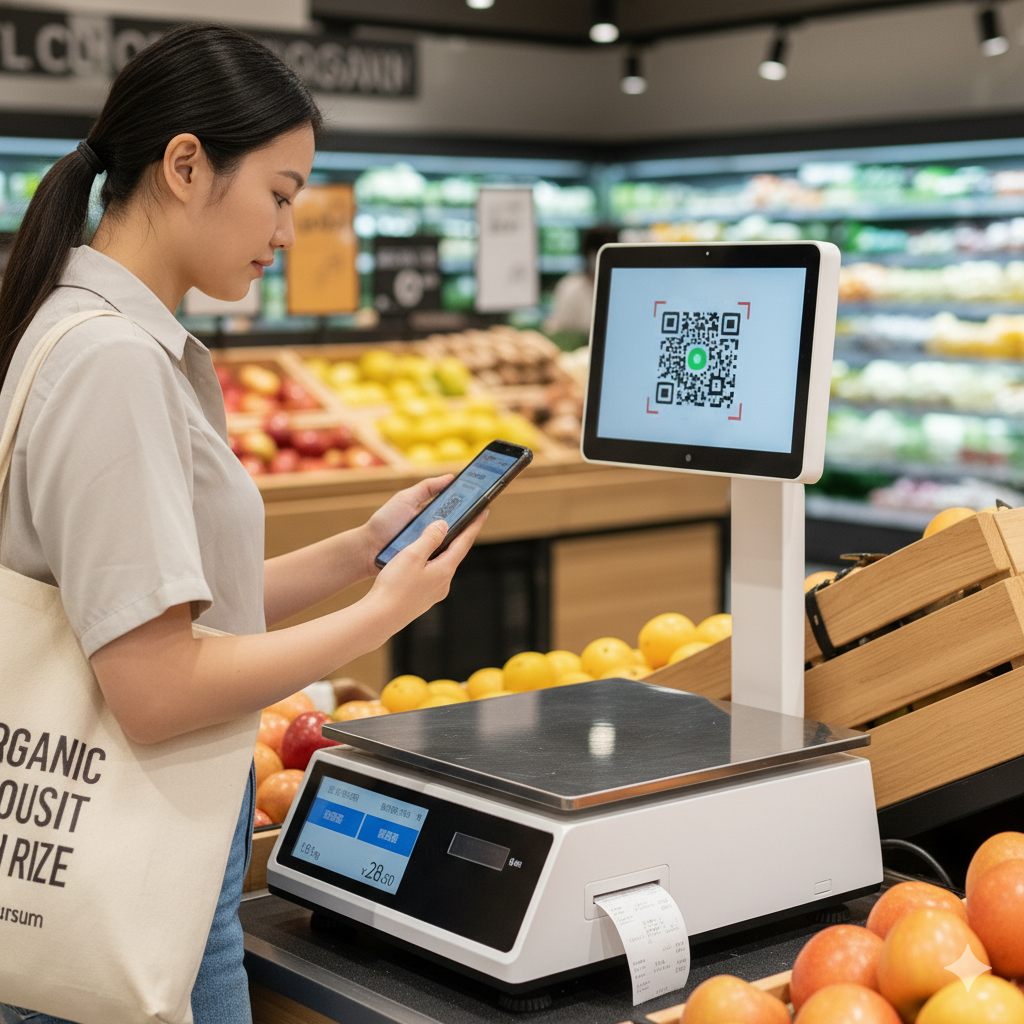table of contents
How do AI retail scales revolutionize checkout for non-standard products?
In retail stores, standardized products (such as pre-packaged goods) can be quickly scanned and checked out using barcodes. However, for non-standardized products like fresh produce, bulk foods, and baked goods, traditional checkout methods often rely on manual identification and input of PLU codes or product names. This is not only inefficient and prone to errors but also a major cause of customer queues. The challenge of achieving fast and accurate checkout for non-standardized items has long been a pressing issue for the retail industry.
Amidst the wave of retail digitalization, AI retail scales are emerging as a key force driving industry innovation. As a crucial vehicle for retail technology transformation, they are comprehensively reshaping the checkout process for non-standardized products such as fresh produce, baked goods, and bulk snacks. By integrating computer vision, deep learning algorithms, and high-precision weighing sensors, AI retail scales automate the entire process from product identification to price calculation, effectively addressing the pain points of traditional scales: reliance on manual operation, low efficiency, high error rates, and high costs.
I. AI Retail Scales: Technological Breakthroughs and Retail Value
In traditional retail scenarios, the checkout process for non-standardized products is cumbersome and labor-intensive. Store staff must individually search for items and manually input or scan labels, which is time-consuming and highly susceptible to errors. AI retail scales, by “understanding products and accurately calculating prices,” automate this entire process, making checkout more efficient and seamless.
Winmore Digital’s AI retail scales utilize proprietary AI visual recognition algorithms and edge-side model compression technology, enabling millisecond-level identification responses even on standard CPU devices. Their self-learning function supports immediate learning of new products without relying on cloud training, significantly lowering deployment barriers.
Compared to traditional scales, AI vision scales can significantly enhance operational efficiency:
- Queue times are reduced by 70%, significantly improving customer experience.
- Reduced reliance on manual labor, saving up to 200,000 yuan in labor costs per store annually.
- Shrinkage rates decrease by 30%, helping stores optimize inventory and replenishment strategies.
AI retail scales are progressively becoming critical infrastructure for retail store digital transformation, assisting businesses in transitioning from “manual-driven” to “intelligent-driven” operations.
II. Three Application Forms of AI Retail Scales in Retail Scenarios
The application of AI retail scales has extended to multiple retail touchpoints, primarily including:
- Smart Scales for Fresh Retail In fresh produce areas (fruits, vegetables, meats, seafood), customers simply place items on the scale, and the system automatically identifies the category, weight, and price, without requiring manual operation or scanning. This process is fast and accurate, significantly boosting store turnover efficiency.
- Self-Checkout Integrated Scales In self-checkout areas, AI vision scales can be deeply integrated with POS systems, achieving “one-step” weighing, identification, and payment. Customers can complete purchases without waiting for manual assistance, truly realizing a cashier-less self-service shopping experience.
- Data-Driven Management Scales At the back-end management level, AI retail scales collect sales and weighing data, providing businesses with real-time sales analysis, inventory forecasting, and operational optimization. Winmore Digital’s system seamlessly integrates with store POS and ERP systems, enabling closed-loop analysis of business data.
III. How AI Retail Scales Work: From Vision to Intelligent Decision-Making
The operating principle of AI vision scales is based on a complete intelligent chain: “visual perception—feature extraction—model matching.”
- Visual Perception: A high-definition camera (typically a 2-megapixel wide-angle camera) captures images from a 70-80 degree vertical angle, reducing background interference.
- Data Collection: Weighing sensors simultaneously collect weight data (using strain gauge or electromagnetic force balance technology).
- Intelligent Computation: A multi-core CPU or NPU processor integrates image and weight data, performing product identification through deep learning models (CNN, YOLO-FFD, etc.).
- Result Output: The system displays the identification results in real-time on a touchscreen and supports various payment methods, including QR code scanning, facial recognition, and card swiping.
This integrated visual and weight recognition mechanism allows the “weighing + identification + payment” three-step process to be completed in seconds, significantly increasing transaction throughput at retail terminals.
IV. Winmore Digital: An Innovation Leader in the AI Retail Scale Industry
As a leading enterprise in the AI+Retail sector, Shanghai Winmore Digital Technology Co., Ltd. (Winmore Digital) is committed to empowering traditional retail equipment with AI technology, transforming them from “hardware tools” into “intelligent terminals.”
The company’s team has deep expertise in computer vision, deep learning, and big data analysis, with R&D personnel accounting for over 85%. Its AI vision scale solutions have served over 100,000 stores globally, covering markets such as China, Singapore, Netherlands, Australia, and the United States.
Winmore Digital’s AI retail scale solution offers the following core advantages:
- High-Precision Identification: Visual recognition accuracy reaches 99.5%, stably adapting to complex lighting and backgrounds.
- Rapid Self-Learning: Supports immediate local learning of new products, eliminating the need for cloud training wait times.
- Strong Hardware Compatibility: Can run on multiple operating systems including Android, Windows, and Linux.
- Lightweight Deployment: AI recognition can be achieved with low-compute devices, making costs more controllable.
V. AI Retail Scales: The Next Standard for the Retail Industry
As technology matures and standardization progresses, AI retail scales are no longer just a “high-end option” but are becoming standard intelligent equipment for retail stores. They not only optimize the customer experience but also serve as a core tool for cost reduction and efficiency improvement for stores.
In the future, Winmore Digital will continue to pursue “AI+Retail Intelligence” as its core strategy, promoting the widespread adoption of AI retail scales in the global market and assisting the retail industry in entering a fully intelligent era.

